人教版新目标九年级英语第3单元Unit3教案
人教版英语9年级全册Unit3_SectionA(4a-4c)教案
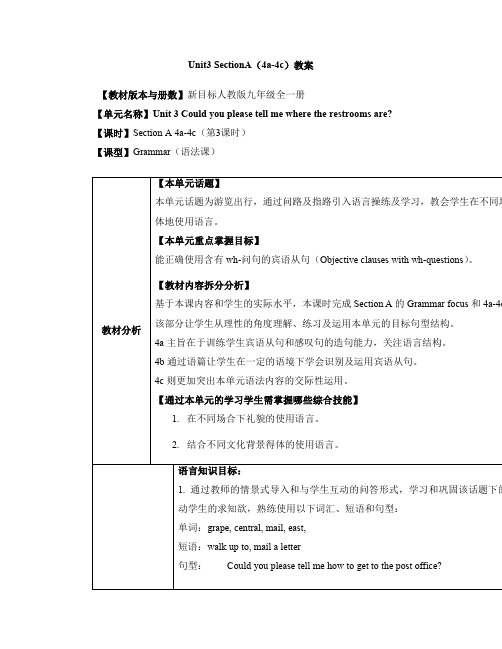
Could you tell me where I can buy some stamps?
Could you please tell me where I can get adictionary?
Do you know where I can get some magazines?
Excuse me, do you know where ____ _____ buy some medicine?
2.当然,顺着这条街有个超市。
Sure. There is a supermarket ____ the street.
3.请你告诉我怎样到邮局好吗?
Could you please tell me _____ ____ get to the post office?
Ask Ss to read the sentences in the column.
Let Ss to observe these sentence structure. Tell the students that today we will learn objectiveclauseswithwh-questions.
B. whose pen it was
C. whose pen it is
D. whose pen was it
Answers:DDBCCB
Function: Ask for information politely and follow directions
Ask:
1.Excuse me, can you tell me where the railway station is?
人教版英语9年级全册Unit3_SectionB(2a-Self_Check)教案

B
a, “could you please tell me where the restrooms are? ”
b. “When is the school trip?”
c, “Excuse me, I wonder if you can help me.” or “I am sorry to trouble you, but....”
【通过本单元的学习学生需掌握哪些综合技能】
1.在不同场合下礼貌的使用语言。
2.结合不同文化背景得体的使用语言。
教学目标
语言知识目标:
1.通过教师的情景式导入和与学生互动的问答形式,学习和巩固该话题下的词汇句型,激发调动学生的求知欲,熟练使用以下词汇、短语和句型:
单词:polite, politely, speaker, request, choice, direction, correct, direct, whom, address, faithfully
在最后的自我检测部分,巩固复习本单元学习的重点词汇和句型。
教学流程
(详见相应教学设计)
教学评价
写进行礼貌地询问的宾语从句,写作内容逐渐发展到使用wh-疑问词引导的宾语从句询问各种问题,写作话题由国内身边琐事发展到国外生活资讯;写作篇幅由句子过渡到语篇,学会独立写作咨询信;最后在具体语境中复习巩固本单元学习的重点词汇和句型。其中前两个环节是循序渐进的,教学中一定要务实第一个环节,为第二个环节奠定基础。
情感态度价值观目标:
通过对本部分的学习,使学生能够了解英语中的礼貌用语。
教学重难点
教学重点:
用wh-疑问词引导的宾语从句礼貌地询问各种问题。
Unit3单元课时教案人教版英语九年级全册
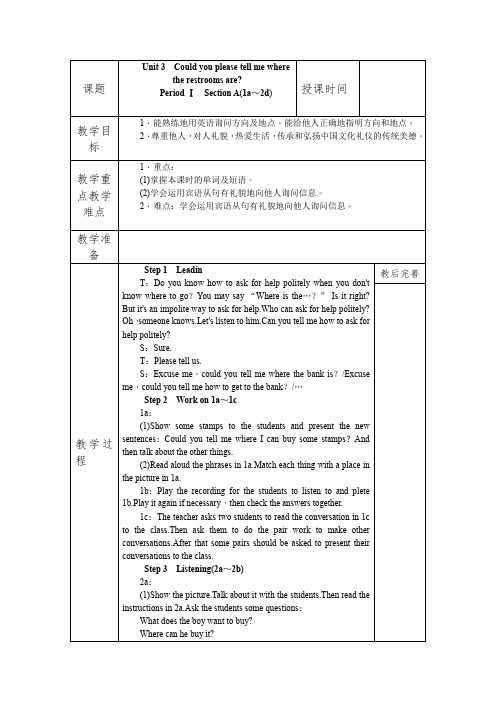
On the way to the restaurant
They pass by…It looks…plays there at…this evening.They have to e…to get a…,because it's always…
课题
Unit 3Could you please tell me where the restrooms are?
PeriodⅠSection A(1a~2d)
授课时间
教学目标
1.能熟练地用英语询问方向及地点,能给他人正确地指明方向和地点。
2.尊重他人,对人礼貌,热爱生活,传承和弘扬中国文化礼仪的传统美德。
(3)What does the word“restroom”actually mean?
2.Play the recording and get students to listen and repeat,and then role-play the conversation.
3.Ask several pairs to act it out.
What are you excited to do when you go to an amusement park?
教学反思
参考资料
课题
PeriodⅡSection A(3a~4c)
授课时间
教学目标
1.能熟练运用宾语从句。
2.培养学生尊重他人,对人礼貌,热爱生活。
Units3-4教案.2023-2024学年人教版英语九年级全册

板书设计
①艺术性:
- 使用不同颜色的粉笔进行板书设计,如用蓝色粉笔书写过去进行时的构成,用红色粉笔标注重点难点。
- 利用图表、图片等元素,将过去进行时的用法以直观的方式呈现,例如用一个正在进行的动作的插图来表示过去进行时。
教学资源拓展
1.拓展资源:
(1)英语绘本:选择一些与过去进行时相关的英语绘本,如《The Cat in the Hat》等,让学生在阅读过程中感受过去进行时的运用,提高他们的语言素养。
(2)英语电影:推荐一些经典的电影片段,如《Back to the Future》、《The Godfather》等,让学生观看并分析其中过去进行时的运用,增强他们的语感。
3.成果分享:每个小组将选择一名代表来分享他们的讨论成果。这些成果将被记录在黑板上或投影仪上,以便全班都能看到。
五、总结回顾(用时5分钟)
今天的学习,我们了解了过去进行时的基本概念、重要性和应用。同时,我们也通过实践活动和小组讨论加深了对过去进行时的理解。我希望大家能够掌握这些知识点,并在日常生活中灵活运用。最后,如果有任何疑问或不明白的地方,请随时向我提问。
第一课时
步骤
师生互动设计
二次备课
教学方法与手段
教学方法:
1. 任务驱动法:通过设计具有挑战性和实际意义的任务,激发学生的学习兴趣和主动性,培养他们的语言能力和合作精神。例如,让学生分组讨论和编写关于过去进行时的故事,并在课堂上进行分享。
2. 情境教学法:通过创设真实、生动的情境,帮助学生理解和运用过去进行时。例如,利用图片、视频等材料,展示过去某个时刻正在进行的动作,引导学生用英语进行描述。
人教版九年级英语全册教案:Unit 3教案

Unit 3Could you please tell me where the restrooms are?教学设计知识目标课堂环节§自主学习案翻译下列词组。
1.买一些邮票buy__some__stamps2.得到关于……的信息get__some__information__about…3.打扰了excuse__me4.向左/右转turn__left/right5.经过书店go__past__the__bookstore6.在……和……之间between__…__and__…7.在左/右边on__the__left/right8.在那边over__there9.在二楼on__the__second__floor10.买一双鞋get__a__pair__of__shoes§课堂导学案Step 1 准备与热身(Preparation)Show pictures to the whole class, one student explains the places in English and another one who doesn't look at the blackboard guesses what place it is.For example, one student says: We can save money or exchange money in this place, another one guesses it is a bank.Get students to guesses the places like bank, post office, bookstore, museum, bathroom, washroom, mall and so on.T: You're new to this school.You need to know where the main office is.How can you ask where the main office is?S: Where's the main office?T: That's one way to ask.But there is a more polite way you can ask.Can you say some of them ?Students:__________________① Can you tell me where Classroom 1 is?② Could you tell me how to get to Classroom 1?……Step 2 呈现与输入(Presentation)1.要求学生翻开课本P17,要求学生查看1a下方的图片并与方框中所给动词短语的描述搭配起来。
人教版九年级英语第三单元教案
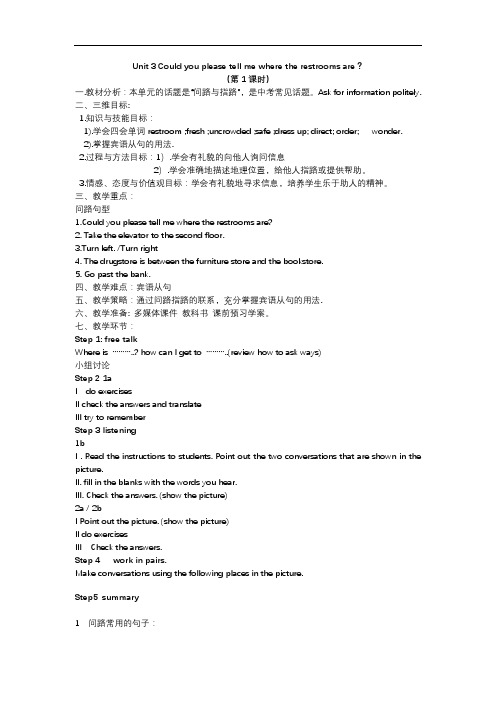
Unit 3 Could you please tell me where the restrooms are?(第1课时)一.教材分析:本单元的话题是“问路与指路”,是中考常见话题。
Ask for information politely.二、三维目标:1.知识与技能目标:1).学会四会单词restroom ;fresh ;uncrowded ;safe ;dress up; direct; order; wonder.2).掌握宾语从句的用法.2.过程与方法目标:1).学会有礼貌的向他人询问信息2).学会准确地描述地理位置,给他人指路或提供帮助。
3.情感、态度与价值观目标:学会有礼貌地寻求信息,培养学生乐于助人的精神。
三、教学重点:问路句型1.Could you please tell me where the restrooms are?2. Take the elevator to the second floor.3.Turn left. /Turn right4. The drugstore is between the furniture store and the bookstore.5. Go past the bank.四、教学难点:宾语从句五、教学策略:通过问路指路的联系,充分掌握宾语从句的用法.六、教学准备: 多媒体课件教科书课前预习学案。
七、教学环节:Step 1: free talkWhere is ………..? how can I get to ………..(review how to ask ways)小组讨论Step 2 1aI do exercisesII check the answers and translateIII try to rememberStep 3 listening1bI . Read the instructions to students. Point out the two conversations that are shown in the picture.II. fill in the blanks with the words you hear.III. Check the answers. (show the picture)2a / 2bI Point out the picture. (show the picture)II do exercisesIII Check the answers.Step 4 work in pairs.Make conversations using the following places in the picture.Step5 summary1 问路常用的句子:Do you know where …is ?Can you tell me how can I get to …?Could you tell me how to get to …?2 英语中表示方位的表达有:next to 贴近,靠近close to 在附近;on the left/right side在左/右边;in the middle of 在……的中间;in front of 在……的前面;between …and …在……之间;be opposite to 在……对面;across from 在……对面。
人教版英语九年级unit3全单元教案

2020年人教版英语九年级Unit 3 Could you please tell me where the restrooms are?Goals●To learn to use Indirect questions ●To learn to tell about places ProceduresWarming up by learning grammarHello everyone. I am a strange here in this city. Could you tell me how to get to the supermarket?All right, I am telling a lie to you. I am not new here. I said so just to help you learn to use the Indirect questions.Now turn to page 87 first and look at the three sentences in the Grammar Focus.Have you noticed the word “where ” and “how ” used in the sentences. The questions introduced by them are called the Indirect questions.1a Matching things with placesOn page 86 is a picture of a city. A visitor is asking someone questions about things to do atE buy some stampsB save money1b Listening and completingIt is difficult to get around in a new place. Now listen to the recording and complete the dialogue in the picture on page 86.TapescriptConversation 1Girl1: Excuse me. Could you tell me where I can buy some stamps?Boy1: Yes. There’s a post office on Center Street.Girl1: Oh. Can you tell me where Center Street is?Boy1: Sure. Go past the bank. Center Street is on your right.Girl1: Thanks a lot.Boy1: No problem.Conversation 2Girl2: Excuse me. Do you know where I can save money?Boy2: Sure. There’s a bank on Main Street.Girl2: Oh. Could you please tell me how to get there?Boy2: Yes... Go straight ahead. The bank is on your left.Girl2: Thank you.Boy2: You’re welcome.Write your words here in the speech bubbles.A: Could you tell me where I can buy some stamps?B: Yes. There’s a post office on Center Street.A: Excuse me. Do you know where I can save money?B: Sure. There’s a bank on Main Street.Read the tapescript and try to underline all the useful expressions used and circle the Indirect questions.1c Doing pairworkIn 1a there are many phrases describing activities. Now use them to make up conversations to talk about your own city. (The Indirect questions are circled.)A: Excuse me. Can you please tell me where I can buy shampoo in this city?B: Sure. There’s a department store over there.A: Excuse me. Can you please tell me where I can get some magazines?B: Sure. There’s a post office around the corner.A: Excuse me. Can you please tell me where I can make a telephone call?B: Sure. There’s a post office one hundred meters down the street.A: Excuse me. Can you please tell me where I can get some information about the town?B: Sure. There’s a library opposite of the hospital.A: Excuse me. Can you please tell me where I can get some writing paper?B: Sure. There’s a department store close to the bus station.A: Excuse me. Can you please tell me where I can buy some stamps?B: Sure. There’s a post office beside the library over there.A: Excuse me. Can you please tell me where I can save money.B: Sure. There’s a big bank beside the café on the main library over there.2a Listening and numberingDo you like shopping? If you do come and listen to the directions for going shopping around a new city.TapescriptBoy1:Excuse me. Can you tell me where I can buy some shampoo?Boy2:Yes. There’s a drug store on the second floor. Um. Let me think... Take the escalator to the second floor and then... then you turn left. Let’s see...Then go past the bank. And um... The drug store is between the furniture store and the bookstore. You should be able to get shampoo there.Boy1:OK, great. Thanks a lot.Boy2:You’re welcome.While listening please number the directions in the order that you hear them.Take the elevator to the second floor.2 Turn left.1 Take the escalator to the second floor.Turn right.4 The drugstore is between the furniture store and the bookstore.3 Go past the bank.Read the tapescript for the Indirect questions and the useful expressions. Circle the Indirect questions and underline the useful expressions.2b Listening and drawingDo you like drawing. Now listen to the recording again to draw a line on the picture on page 87 to show how the boy walks to the drugstore.2c Doing pairworkWhat else do like to buy? Then make conversations in pairs using the otherplaces in the picture on page 87.A: Excuse me. Do you know where I can exchange money?B:Sure. There’s a bank on the second floor. Take the escalator to the second floor and turn right. The bank is next to the bookstore.A: Excuse me. Do you know where I can buy music CD?B:Sure. There’s a Music Magic shop on the first floor. Don’t take the escalator. It is next to the escalator room.A: Excuse me. Do you know where I can get a dictionary?B:Sure. There’s a bookstore on the second floor. Take the escalator to the second floor and turn right. The bookstore is next to the bank.A: Excuse me. Do you know where I can buy some candies?B:Sure. There’s a drugstore on the second floor. Take the escalator to the second floor and turn right. The bank is next to the bookstore.A:Excuse me. Do you know where I can buy a desk?B:Sure. There’s a furniture store on the second floor. Take the escalator to the second floor and turn right. The bank is next to the drugstore.Now read aloud the conversations again to Circle the Indirect questions and underline the useful expressions.3a Reading and listingOn page 88 is an article about going to a mall. Now read it to list the advantages and disadvantages of going to a mall. While you read, Circle the Indirect questions and underline the useful expressions.They’re all at the mall.After school, a lot of young people go to the mall. We decidedto talk to some students about why they go there.Interviewer: Why do you go to the mall?Yu Yue: I go to the mall because my friends hang out there. But I don’t really like it.Interviewer: Oh? Why not?Yu Yue: The air isn’t fresh. I prefer being outside. Also, it’s usually crowded.Interviewer: And how about you?Li Jun: Oh, I love the mall. There’s always something happening. There are a lot of free concerts there. It’s also just fun to watch people.Hu Peng: I like the mall, too. I like to go in the music store and listen to CDs. I also like to look at books in the bookstore.Yu Yue: Well, when I go into stores I always spend too much money!Advantages disadvantagesThere’s always something happening.The air isn’t fre sh.There are a lot of free concerts there. It’s usually crowded.It’s also just fun to watch people.when I go into stores I always spend too muchmoney!I like to go in the music store and listen to CDs.I like to look at books in the bookstore.3b Doing groupworkWhere do you usually hang out with friends? What are the advantages and disadvantages of hanging out at your house, at a mall or at your school? Now in groups talk about them.A: Where do you usually hang out with your friends?B: We usu ally go to my friend, Qiu’s place.A: Is that a good place to hang out?B:Well, it has advantages and disadvantages. It’s kind of small. But Qiu’s mom is a wonderful cook, so we always have great snacks.A: Where do you usually hang out with your friends?B: We usually go to the bookstore.A: Is that a good place to hang out?B:Well, it has advantages and disadvantages. It’s very big and the air is fresh,too. And we can just read books there. We don’t have to buy books. So wealways have a good time there.A: Where do you usually hang out with your friends at weekends?B: I usually stay at home.A: Is that a good place to hang out for the weekends?B: Well, it has advantages and disadvantages. My room is kind of small. But I have a computer there. I go online reading and watching. It is a wonderful place. So I always hang in at home.4. Directions challengeNow we are going to challenge one another. Write directions from your school to three certain places. Read the directions to each other and guess the places.A: Go out the front door and take a right. Walk about three blocks. Go past the park, and turn left onto Oak Street. Then it is the…?B: Then it is the bookstore.A: Go out the back door and take a left. Walk about two blocks. Go past the post office, and turn right onto Chang’an Street. Then it is the…?B: Then it is the Teachers College.A: Go out the side door and take a right. Walk about three blocks. Go past the bus station, and turn left onto Flag Street. Then it is the…?B: Then it is the lake.Closing down by looking and sayingTo bring the period to an end let’s look at the picture and talk about things happening in it.SECTION BGoalsTo learn to talk about places in the cityTo learn to read about placesProceduresWarming up by thinking about How to ask for directions when travelingBEST PROCEDURE:◆Get the name and address of the place you wish to visit.◆Talk to the Hotel Manager or someone that can read and write. If they get weak looking, or they hesitate to read, do not embarrass them, go to the next person. The probably cannot read.◆After you have found hopefully someone that speaks your language or English you can start to ask questions...1a Putting wordsOn page 89 is a list of words and a box with places. Now go over them and put in words besidethe place, the most important quality words first.Places Qualities1. restroom Clean→safe→uncrowded2. museum Fascinating→interesting→beautiful3. restaurant Delicious→uncrowded→inexpensive4. park Big→interesting→clean5. subway Convenient→safe→6. mall Uncrowded→inexpensive→1b Doing pairworkYou are familiar with the words in 1a. Now use them to talk about your city.A: The Fine Arts Museum is really interesting.B:Yes, and it’s beautiful, too.A: The Computer Room is really big.B:Yes, and it’s convenient, too.A: The Dining Hall is really clean.B: Yes, and the food is cheep, too.A: The Bus Station is really safe.B:Yes, and it’s uncrowded, too.A: The Central Square is really fascinating.B: Yes, and it’s not far away, either.2a Listening and writingSome tourists are going around your city. They are asking about things. Now listen to them talking and write what they ask about.Conversation 1Boy1: Could you tell me where there’s a good place to eat?Clerk:Of course. There are a lot of good restaurants in Sunville. What kind of food are you looking for?Boy:Vegetarian.Clerk:I’d try Green Land. They have delicious salads.Conversation 2Girl: Do you know if there are any public restrooms around here?Clerk: Yes. You’ll find some at the corner of Market and Middle Streets.Girl: Ummm... are they clean?Clerk: Oh, yes. They’re very clean.Conversation 3Mother: Could you tell me if there is a good museum in Sunville?Clerk:Well, we have several. What kind of museums do you like—history? Science? A children’s museum?Father: How about history? I like history museums. They’re fascinating.Girl1: Oh, Dad! History museums are boring. Let’s go to a science museum.Boy2: Science? We always go to science museums. I don’t like science museums. I want to go to a children’s museum. They’re more fun.Girl2: Well I’m too old for a children’s museum. Why don’t we go to an art museum?Clerk:Why don’t you go to the computer museum? There are a lot of fun things for childrenthere. You can learn all about the history of computers, as well as learn about science. Family: That’s a great idea! Let’s go to the computer museum. How do we get there?Do you know what the tourists are asking about?The tourists ask about…Conversation 1 RestaurantsConversation 2 public restroomsConversation 3 a good museum2b Listening and writingNow you are to listen to the conversations for the second time. Listen for where the man says the tourists should go.The tourists should go to…Conversation 1 Green LandConversation 2 The corner of Market and Middle StreetsConversation 3 The computer museumTo make a better use of the listening exercise we shall go on to read the tapescripts. While you read, Circle the Indirect questions and underline the useful expressions.2c Doing pairworkFor fun and for learning let’s role play the conversations between the man and the tourists. Who will be the man? All right, it’s you, Zhao Hongtao.A:Can you tell me where there’s a good place to eat?B: Of course. What kind of food do you like?A: I like vegetarian food.B: There are a lot of good restaurants in Sunville. Why not go to GreenLand. They have delicious salads.A: Can you tell me if there are any public restrooms around here?B: Yes, there’s one at the corner of Market and Middle Streets.A: A re they clean?B: Oh, no. They’re very dirty.A: Could you tell me if there is a good museum in Sunville?B:There’s a computer museum at the corner? There are a lot of fun things for both children and parents.A: That’s a great place! Let’s go to the computer museum. How do we get there?B: Take Bus 11.3a Reading and fillingGo to page 90, please. Read the article on the left and fill in the charts on the right. While reading try to underline all the useful expressions and circle all the connectivesEat, have fun and learn in Watertown!Watertown is a great place for the family to take a vacation.Teenagers will want to visit the world’s largest water slides and eat at Uncle Bob’s. A different rock band plays at Uncle Bob’s every night. Kids will enjoy the Clown City Café. They have organized games and the staff dress up as clowns.There’s also a lot for parents in Watertown. If they love good food, they can find it at the Farmer’s Market where the food is both delicious and cheap. While the children have fun, parents can take the dance lessons on the beach. And everyone can learn something in Watertown. There are threemuseums!Teenagers love the Sports Museum and kids enjoy the Science Museum. Parents will spend many happy hours walking through the History Museum.After reading fill in the chart on page 90 on the right.Kids Teenagers ParentsEat Uncle Bob’s Farmer’s MarketHave fun Clown City CaféWater slides Dance lessonsLearn Science Museum Sports Museum History Museum3b Completing a tour guideOn page 90 is an unfinished tour guide to Sunville. Now turn back to 2a and 2b for information to finish it.SUNVILLE has something for everyone. If you’re looking for museums,you will find several here. History museums are fascinating to parents.But kids may find them boring. In a science museum you can learn lots ofthings. Children’s museums are more fun. An art museum is interesting topeople who like arts. If you go to the computer museum you will find alot of fun things for children there. They can learn all about the history ofcomputers, as well as learn about science.IN SUNVILLE there are a lot of good restaurants, too. They are nice places to eat. You can find vegetarian food and meats, too. Green Landoffers delicious salads.Public restrooms around SUNVILLE are clean and beautiful. You’ll find some easily at the corner of Market and Middle Streets.3c Write a guide to your city or townMY HOMETOWN: TAIYUANTaiyuan, the capital city of Shanxi Province, lies in the north basin of Middle Jin (Jin is another name for Shanxi Province) and crosses the River Fen. The city area administers three districts, one subdivided city and five counties. The history of the city can be traced back to over 2,400 years ago. It was established in 497 BC, the end of the Spring and Autumn Period (the slavery Period in China) and was named Jinyang, the northern bank of the Jin River. In Chinese, the northern bank of waters is called yang. In 982, Song Taizong, Zhao Kuangyi, the second emperor of the Song Dynasty burned and flooded Jinyuan City. After that, he ordered one of the officials, Pan Mei to build Taiyuan City in Tangming Town, north of Jinyuan City. Thus, came the present Taiyuan City. Taiyuan, in Chinese, means the greatest plain. In fact, it is dominated by rugged hills and hilly areas. Only one-fifth of the whole area is plains. Taiyuan is surrounded by mountains in the east, west and north; only the southern part is alluvial plains. Taiyuan abounds in various minerals, especially coal and iron, so honors the name, "the home of coal and iron." Taiyuan is of continental climate at temperate zone. It is dry and cold in winter, hot and rainy in summer, dusty and windy in spring, cool and comfortable in autumn. The annual averagetemperature is 9.5 Degree Celcius.4 Doing groupworkOne of the group member is to role play the information booth worker, and theothers are the tourists. The tourists are asking about your city.Tourist: What is Taiyuan?Information booth worker: It is the capital city of Shanxi Province.Tourist: Where is Taiyuan?Information booth worker: It lies in the north basin of Middle Jin (Jin is another name for Shanxi Province) and crosses the River Fen.Tourist: How many districts are there in Taiyuan?Information booth worker: The city area administers three districts, one subdivided city and five counties.Tourist: How old is the city?Information booth worker: The history of the city is as old as 2,400 years. It was established in 497 BC, the end of the Spring and Autumn Period (the slavery Period in China). What was its old name?Tourist:Information booth worker: It was named Jinyang, the northern bank of the Jin River. In Chinese, the northern bank of waters is called yang.…Closing down by going around TaiyuanAt the end of the period I will take you on a trip to Taiyuan. Come with me.SELF CHECK2. Looking and writingThere is a map on page 91 in the middle. Look at it and ask five questions. Answer them as a local person might do.1.Excuse me, could you tell me where the bank is?→It’s between the Fifth Avenuet and theGarden Road on the west side of the Central Street.2.Excuse me, could you tell me where the movie theatre is?→It’s at the corner of the FifthAvenue and the Central Street. You can find it on your right.3.Excuse me, could you tell me where the restaurant is?→There are three restaurants in thecity. The best one is n earest from here. It’s between the Fifth Avenue and the Road, just by the Central Street.4.Excuse me, could you tell me where the library is?→It’s at the west end of the Garden Roadopposite to the best restaurant in the city.5.Excuse me, could you tell me where the shopping mall is?→It’s the tallest building in the city.It’s located west of the Central Street between the Fifth Avenue and the Garden Road.Just for fun!Reading poems is fun. So go on reading this little poem by James Whitcomb Riley (1849-1916).A BOY'S MOTHERMY mother she's so good to me,Ef I was good as I could be,I couldn't be as good—no, sir!—Can't any boy be good as her!She loves me when I'm glad er sad;She loves me when I'm good er bad;An', what's a funniest thing, she saysShe loves me when she punishes.I don't like her to punish me.—That don't hurt,—but it hurts to seeHer cryin'.—Nen I cry; an' nenWe both cry an' be good again.She loves me when she cuts an' sewsMy little cloak an' Sund'y clothes;An' when my Pa comes home to tea,She loves him most as much as me.She laughs an' tells him all I said,An' grabs me up an' pats my head;An' I hug her, an' hug my PaAn' love him purt' nigh as much as as Ma.Reading: Could you please lend me your pen?Before you read, listen to the recording for the general idea of the passage.While you read, underline all the expressions and circle all the connectives.Asking for information or help is a very common and necessary activity, especially when we visit a foreign country, so knowing how to ask for information politely is important. In English,the restrooms are?” are similar requests —but the first could sound rude. It’s important to use correctlanguage, but sometimes this alone is not enough—make requests.me, Mr West. Do you k now where my book is?”, your question will sound much more polite. On the other hand, it might be all right to say “Where is my book?” in some situations, perhaps with peopleyou know well.And you would not usually say, “Peter, lend me your pen.” A very direct order like this can sound最新Wordrude in English. Usually in English polite questions are longer and include extra language such as ‘Could you please…?’ or ‘Can I ask…?’ It sounds more polite to say, “Peter, could you please lend me your pen?” Sometime s, we might even need to spend some time leading in to a question or request. For example, if you stop a stranger in the street, we might first say, “Excuse me, I wonderIt might seem that speaking politely is more difficult than being direct, and in a way this may be true. However, in order not to offend people, learning about language etiquette is just as learning grammar or vocabulary. And doing this will also help you become better at English, or any otherPart 2: Teaching Resources (第二部分:教学资源)I. How to ask for directionsWhen you don't know where you are, or when you don't knowhow to get to a place, you can ask directions. Talk to the firstperson that you see. Ask that person where you should go.I don't like maps. I prefer to just stop and ask directions.I think we're lost. Let's pull over and ask directions.。
人教版英语九年级全册Unit3 Writing优质课教案

Unit3 Writing优质课教案教学目标〔Teaching objectives〕:1、知识与能力(Knowledge and ability objects): 礼貌地向他人询问信息和为他指路。
2、过程与方法(Method objects):观察周围环境并用恰当的语言去描述,师生对话,小组活动,借助多媒体和挂图来提高学生的主动性。
3、情感目标(Moral objects ):通过观察和指路,增进人与人之间的关系,学会做一个有爱心的人,关心身边的家人和朋友。
教学重点(The important point)1、The vocabulary: the way to…, turn right, across from, next to, go down/along, visit, at the gate2、Language:Would you please tell me the way to the post office? / Could you please tell me ...?教学难点(The difficult point ):Use the language to talk about direction.教学过程(Teaching procedures):Step 1 Warming-up and Leading in (4 mins)1、T: Boys and girls, please turn these phrases into English1、通往……的路2、乘出租车3、路过4、在……和……之间5、停车场,停车区6、在……的隔壁;在……的旁边7、百货商店8、期待Check the answers , call the Ss to read the answers.参考答案:1. the way to ...2. take a taxi3. pass by4. between …and…5. parking lot / car park6. next to…7. department store8. look forward to2、T: Fill in the blank with right phrases (4 mins)1、我很快乐你要来看望我的爸爸。
人教版九年级 Unit 3 Could you please tell me where the restrooms are知识点教案
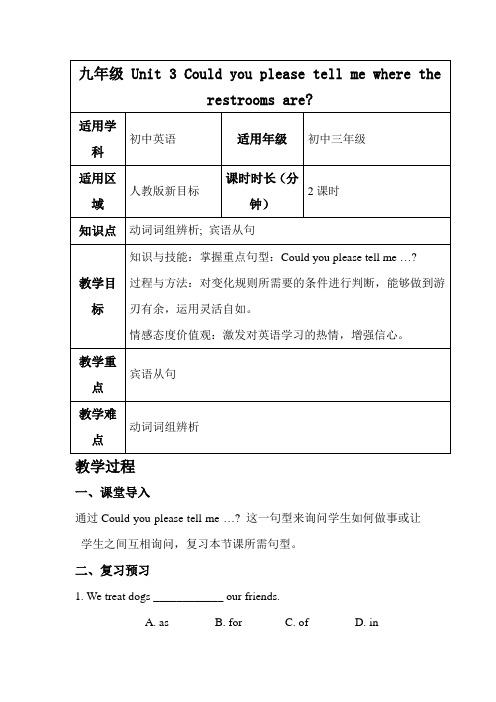
教学过程一、课堂导入通过Could you please tell me …? 这一句型来询问学生如何做事或让学生之间互相询问,复习本节课所需句型。
二、复习预习1. We treat dogs ____________ our friends.A. asB. forC. ofD. in【答案】A【解析】本题考察介词搭配,“把……当……对待”用treat sb. as/like…,故选A。
2. Mr. Mao ____________ for 35 years.A. diedB. dyingC. has been deadD. death 【答案】C【解析】本题考察现在完成时,“死”的延续式是be dead。
3. Not only Tom but also Mike __________ English very much.A. likeB. likesC. to likeD. liked【答案】B【解析】本题考察not only … but also…做主语,谓语动词采用“就近原则”。
4. We all went to the park __________ Tom. We played happily together.A. besideB. besidesC. exceptD. by【答案】B【解析】本题考察介词,根据句意:除Tom外,我们也都去了公园。
故选B。
5. ---Could you tell me __________?---Yes, there is one between the school and the post office.A. where the bookstore isB. where is the bookstoreC. how far is the bookstore isD. how far the bookstore is【答案】A【解析】本题考察宾语从句,用陈述语序,排除B和C;根据句意选A。
人教版九年级英语上册Unit 3 Unit3 Section A3 (Grammar Focus-4c)教案

Section A 3 (Grammar Focus-4c)Step 1 Revision1. How did Alice and He Wei think of the new ride?Students say the sentences together?Alice thought that it looked pretty scary. He Wei thought that it would be fun.2. After the ride, Alice and He Wei talked about their feeling.Alice thought that was fun! She was scared at first, but shouting really did help. He Wei told Alice that “You never know until you try something.”3. Alice and He Wei talked about Uncle Bob’s.Alice thought this restaurant looked interesting. It seemed a rock band plays there every evening. He Wei suggested that they could have dinner there.Step 2 Grammar Focus1) Let students complete the sentences.1. 打扰了,你知道我能在哪买到一些药?Excuse me, do you know where ____ _____ buy some medicine?2. 当然,顺着这条街有个超市。
Sure. There is a supermarket the street.3. 请你告诉我怎样到邮局好吗?Could you please tell me _____ ____ get to the post office?4. 对不起,我不确定怎样到那。
九年级英语第三单元教案人教版
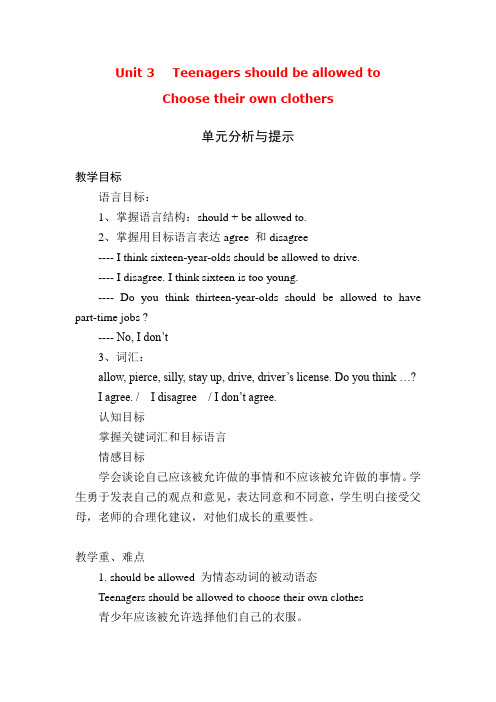
Unit 3 Teenagers should be allowed toChoose their own clothers单元分析与提示教学目标语言目标:1、掌握语言结构:should + be allowed to.2、掌握用目标语言表达agree 和disagree---- I think sixteen-year-olds should be allowed to drive.---- I disagree. I think sixteen is too young.---- Do you think thirteen-year-olds should be allowed to have part-time jobs ?---- No, I don’t3、词汇:allow, pierce, silly, stay up, drive, driver’s license. Do you think …?I agree. / I disagree / I don’t agree.认知目标掌握关键词汇和目标语言情感目标学会谈论自己应该被允许做的事情和不应该被允许做的事情。
学生勇于发表自己的观点和意见,表达同意和不同意,学生明白接受父母,老师的合理化建议,对他们成长的重要性。
教学重、难点1. should be allowed 为情态动词的被动语态Teenagers should be allowed to choose their own clothes青少年应该被允许选择他们自己的衣服。
情态动词的被动语态句型:can / may / must / should / could be + 过去分词。
All members of the audience should be dressed neatly.所有的观众应该穿着整齐。
Food or drink should not be taken into the concert hall.食物和饮料不应该被带进音乐厅。
人教版新目标九年级英语Unit3单元说课稿

人教版《新目标英语》九年级上册《Unit 3 Teenagers should be allowed to choose their own clothes.》说课稿一、教材分析(一)教材的地位及作用1、新目标英语教材概述《新目标英语》教材的语言教育理念是:知识用于行动,强调语言应用,培养创新、实践能力,发展学习策略。
它采用任务型语言教学(Task-based Language Teaching)模式。
教材中每单元都设计一个或几个与该单元话题有关的任务,让学生在完成任务的过程中,使用英语获取信息,用英语进行交流,培养运用英语解决实际问题的能力。
每一单元由四个版块构成:Section A(基本的语言知识)、Section B(知识的扩展和综合的运用)、Selfcheck(学生自我检测本单元所学的语言知识)、Reading(为了加强学生的阅读能力的大量语篇输入)。
2、单元分析及教材处理本单元以rules为中心话题,让学生学会谈论允许和不允许做的事情;应该被允许和不被允许做的事情;能够针对被允许和不被允许做的事情发表自己的观点,并且能叙述同意或不同意的理由。
本课时的内容为Section A 1a-2c。
:第一模块围绕What should teenagers be allowed to do?这一话题展开思维(1a)、听力(1b)、口语(1c) 训练;第二模块围绕“agrees” and “disagrees”进行听力(2a-2b)、口语(2c) 训练,并就所学语言结构进行总结(Grammar Focus)。
这课时的重点任务是导入新的语言,即New function presenting。
(二)教学目标的确定根据《英语课程标准》关于总目标的具体描述,结合第3单元的教材内容,我按语言目标、认知目标、情感目标三个方面将本课时的教学目标细化:1、语言目标(1)语言结构:含情态动词的被动语态should be allowed to(2)语言功能:谈论规章制度;表达同意或不同意。
人教版新目标九年级英语unit3教案
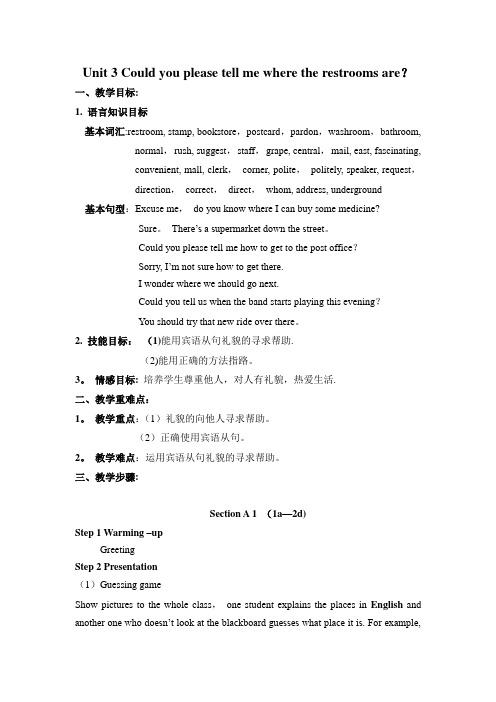
Unit 3 Could you please tell me where the restrooms are?一、教学目标:1. 语言知识目标基本词汇:restroom, stamp, bookstore,postcard,pardon,washroom,bathroom, normal,rush, suggest,staff,grape, central,mail, east, fascinating,convenient, mall, clerk,corner, polite,politely, speaker, request,direction,correct,direct,whom, address, underground基本句型:Excuse me,do you know where I can buy some medicine?Sure。
There’s a supermarket down the street。
Could you please tell me how to get to the post office?Sorry, I’m not sure how to get there.I wonder where we should go next.Could you tell us when the band starts playing this evening?You should try that new ride over there。
2. 技能目标:(1)能用宾语从句礼貌的寻求帮助.(2)能用正确的方法指路。
3。
情感目标:培养学生尊重他人,对人有礼貌,热爱生活.二、教学重难点:1。
教学重点:(1)礼貌的向他人寻求帮助。
(2)正确使用宾语从句。
2。
教学难点:运用宾语从句礼貌的寻求帮助。
三、教学步骤:Section A 1 (1a—2d)Step 1 Warming –upGreetingStep 2 Presentation(1)Guessing gameShow pictures to the whole class,one student explains the places in English and another one who doesn’t look at the blackboard guesses what place it is. For example,one student say: We can save money or exchange money in this place,another one guess it is a bank。
新人教版新目标英语九年级Unit3全单元课件(共123张ppt)

【学以致用】 ①(2013·泰 安 中 考 )—Excuse me, could you tell me where______? —Sure, sir. You can try www. taobao. com. A. can I join in the group-buying B. did I join in the group-buying C. I can join in the group-buying D. I joined in the group-buying
我想知道这个公园今天什么时候关门。 I__________ __________ the park__________ today. 答案: wonder when; closes
Could you please tell me where the restrooms are? Do you know when the bookstore closes today? _________________________________________________ 答案: 宾语从句。陈述语序。
②(2013·菏 泽 中 考 )—Sir, could you please put out your
cigarette? This is a smoke-free(无烟的)school.
—____
A. I’m sorry about this.
B. No problem.
C. Sure, I’d love to.
2. ——打扰一下, 你知道我在哪里能买到明信片吗? —Excuse me, do you know__________ __________ __________ get some postcards? ——当然可以。去二楼。在银行和超市之间一家书店。 —Sure. Go to__________ __________ floor. __________ a bookstore__________ the bank__________ the supermarket. 答案: where I can; the second; There’s; between; and
人教版九年级英语Unit 3教案
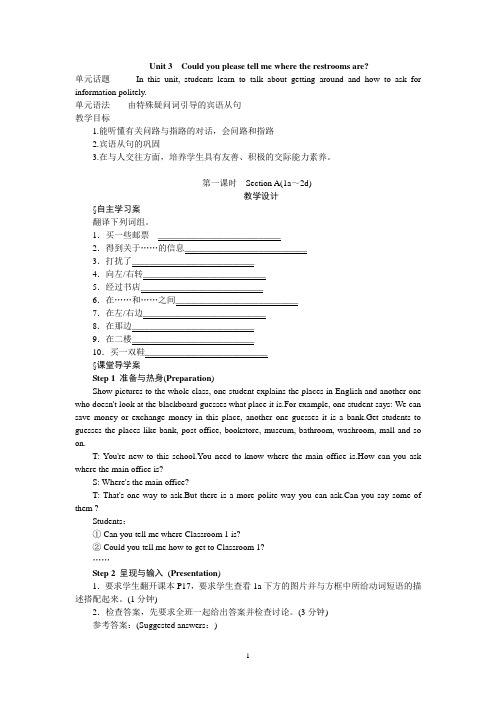
Unit 3Could you please tell me where the restrooms are?单元话题In this unit, students learn to talk about getting around and how to ask for information politely.单元语法由特殊疑问词引导的宾语从句教学目标1.能听懂有关问路与指路的对话,会问路和指路2.宾语从句的巩固3.在与人交往方面,培养学生具有友善、积极的交际能力素养。
第一课时Section A(1a~2d)教学设计§自主学习案翻译下列词组。
1.买一些邮票____________________________2.得到关于……的信息____________________________3.打扰了____________________________4.向左/右转____________________________5.经过书店____________________________6.在……和……之间____________________________7.在左/右边____________________________8.在那边____________________________9.在二楼____________________________10.买一双鞋____________________________§课堂导学案Step 1 准备与热身(Preparation)Show pictures to the whole class, one student explains the places in English and another one who doesn't look at the blackboard guesses what place it is.For example, one student says: We can save money or exchange money in this place, another one guesses it is a bank.Get students to guesses the places like bank, post office, bookstore, museum, bathroom, washroom, mall and so on.T: You're new to this school.You need to know where the main office is.How can you ask where the main office is?S: Where's the main office?T: That's one way to ask.But there is a more polite way you can ask.Can you say some of them ?Students:__________________① Can you tell me where Classroom 1 is?② Could you tell me how to get to Classroom 1?……Step 2 呈现与输入(Presentation)1.要求学生翻开课本P17,要求学生查看1a下方的图片并与方框中所给动词短语的描述搭配起来。
人教版九年级英语unit3教案
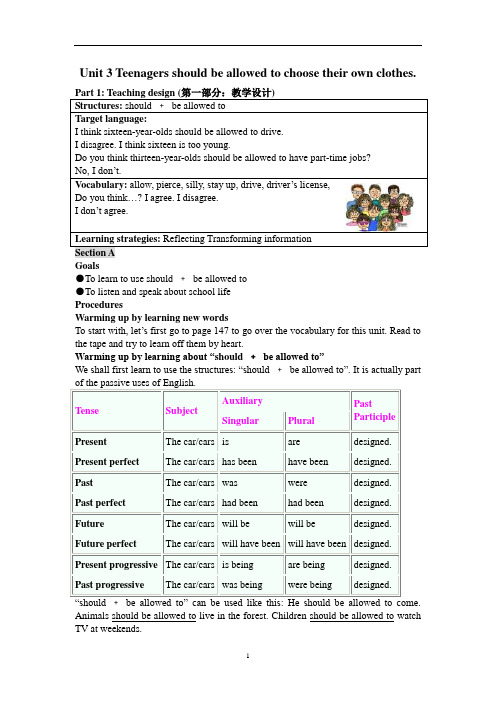
Unit 3 Teenagers should be allowed to choose their own clothes.Goals●To learn to use should ﹢be allowed to●To listen and speak about school lifeProceduresWarming up by learning new wordsTo start with, let’s first go to page 147 to go over the vocabulary for this unit. Read to the tape and try to learn off them by heart.Warming up by learning about “should ﹢be allowed to”We shall first learn to use the structures: “should ﹢be allowed to”. It is actually partAnimals should be allowed to live in the forest. Children should be allowed to watch TV at weekends.1a Reading and circlingFor practice of the “should ﹢be allowed to” r ead the statements in the box on page 18 and circle A for agree or D disagree.1b Listening and circlingListen and circle “T” for true or “F” for false beside the statements in the box on pageIn pairs look at the statements in activity 1a and makeconversation. You may use the phrases in the box on page 18A: I think teenagers should be allowed to go out with their friends.B: I agree. They are old enough.A: I think teenagers should be allowed to go to the mall with their classmates.A:I think teenagers should be allowed to get their driver’slicense.A: I think teenagers should be allowed to drive.A: I think teenagers should be allowed to get their ears pierced.A:I think teenagers should be allowed to watch TV at weekends.A: I think teenagers should be allowed to take the school bus.A: I think teenagers should be allowed to buy a new blouse at the mallA: I think teenagers should be allowed to choose their own clothes.B: I agree. They are old/ clever/ strong/ bright/ serious/ kind/ careful/ lucky/ enough. 2a Listening and checkingNext we are going to listen and check on page 19 what Kathy thinks. You may circleYou are going to listen again to the recording just now tonumber Kathy’s and Molly’s re asons in the correct order onpage 19.Next you are going to make in pairs a list of things teenagersshould and should not be allowed to do. Discuss your listwith your partner.A: Do you think teenagers should be allowed to drive?B: Yes, I think so.A: Do you think teenagers should be allowed to work late at night?B:No, I don’t think so. I don’t think they should be allowed to work late at night. They need to get enough sleep.A: Do you think teenagers should be allowed to disagree with their teachers?B: Yes, I think so.A: Do you think teenagers should be allowed to get tired doing their homework?B:No, I don’t think so.A: Do you think teenagers should be allowed to work every night?B: Yes, I think so.A: Do you think teenagers should be allowed to cut one’s hair?B: Yes, I think so. I kind of like my own style. It looks cool.A: Do you think teenagers should be allowed to have many friends?B:No, I don’t think so. They may meet bad people if they have too many friends. A: Do you think teenagers should be allowed to work on weekends?B: It depends on what they do. They may spend time with parents on weekends.3a Reading and writingYou are to read a dialogue between Sun Fei and Wu Yu on page 20.After reading you shall write in the chart Sun Fei’s and WuYu’s rules.Use “Don’t…” and “You can” to express your ideas.Jot down all the useful phrases form their dialogue.In pairs role play the conversation in 3a using the information in thechart on page 20.A: What rules do you have at home?B:Well, I’m not allowed to go out on school nights. How aboutyou?A:I’m not allowed to go out on school nights either. But I can watchTV with my sister.A: What rules do you have at school?B:Well, We’re not allowed to go out to movies on school nights. How about you?A:We’re not allowed to go out to movies on school nights either. But We can watch VCD with our teachers on the school playground.4 Doing groupworkTurn to page 20 and find someone in your group who has to g o home after school, who is allowed to stay up until 11:00 pm, who has to stay at home on school nights, who is allowed to watch TV every night, who had to clean up his room every morning.Write their names in the chart on page 20Closing down by reciting a kid poemAnother kid's poemThere is nothing under the bedOr on your closet floor,The monster is inside your headDon't worry anymore.It'll be there every nightIn your dreams to give you frightEvery time you turn off the lightAs long as you believe it.There is no monster on the stairsNor anywhere down the hallThis old house just settles at nightYou hear the creaks, that's allYou think you see a dragon peekThrough the window with a fang-ed beakAnd that's why you can't go to sleepAs long as you believe it.Mama loves you, daddy, tooAnd you will grow up tallNothing's going to happen to youWe'll take care of it all.You will be a fine young manA brave little boy who never ranWhatever you want to do, you canAs long as you believe it.So listen to me now, you poohIt's off to sleep right now with you.Daddy knows what you can doAs long as you believe it.SECTION BGoals●To read about rules of school●To talk about rules of schoolProceduresWarming up by talking about rulesHello, class. Are there any rules for us in this class? What are they? How were they made?Now list some of them and talk about them in pairs.1a Reading and checkingRead the questions on page 21 and write either “A” for always, “U” for usually, “S”In pairs you are to talk about your answers in activity 1a.I am going to play a dialogue to you. It is between a man and a boycalled Peter. They are talking about a math test. You are to listen andcircle the things in activity 1a you hear. While listening try to note theexpressions used.TapescriptListen again to the dialogue and match the sentence parts in the box onpage 21.Now copy down the expressions from the dialogue into your notebook.They are shown on the blackboard.2c Doing group workNext it’s reading time. Let’s read the article on page 22 and answer the questionsRole play a conversation using information from 3a.A:I think our school rules of always wearing school uniforms at school should be changed.B: Well, Mary and I talked about the rules the other day.A: At our school, we have to wear uniforms every day. That isbad for us.B: Yes, I agree. The problem is that all of us think the uniformsare ugly.A: I think young people should look smart and so we should beallowed to wear our own clothes.B: But our teachers believe that if we did that, we would concentrate more on our clothes than our studies.A: I disagree with them. We would feel more comfortable and that is good for studying. If we can't do that, we should be allowed to design our own uniforms. That would be a good way to keep both teachers and us happy.B:It’s also probably a good idea for parents to allow us to study in groups duringevening.A: I think so. I know we get noisy sometimes, but we learn a lot from each other.B: I also think that vacations should be longer.A:I agree with you on that. At present they're too short. Longervacations would give us time to do things like volunteering.B:Last summer I had an opportunity to volunteer at the localhospital, but I couldn’t because I had to go back to schools. It would be a good experience for me because I want to be a doctor when I'm older.A:Let’s go to talk to our teachers about the school rules after scho ol.B: OK! I agree with you!4 Making a list of rulesSuppose you and your friend are starting an English club. Make a list of rules aboutGet Up! Get Up!"Get up! Get up! Get out of bedyou lazy bum, you sleepyhead."Yes, that is what my mother saidat eight-oh-five today.She left the house and drove to work.She'll soon be feeling like a jerkwhen she finds out -- I have to smirk --Today is Saturday.--Kenn NesbittSELF CHECK1 Filling in blanksTo test your study this week you are to fill in each blank on page 23 with a correct word given. Change the form if it is necessary.2 Reading and writingYou are going to read the article on page 23 first and then write a letter to the editor agreeing or disagreeing. Explain your reasons.While you are reading cut the sentences into thought groups and underline the expressions.3. Helping and learningAt our school, we sometimes have a special day/ to help others. Last year/ we went to an old people’s home/ and sang songs/ and performed a play /for them. The old people were very happy. We should be allowed/ to take time/ to do things/ like that/ more often. For example, we should visit primary schools/ and help teach young students. I want to be a teacher/ when I'm older/ so it would be a great experience/ for me. Other students would like to do other jobs. For example, my friend Tian Ge wants/ to write for a newspaper. She should be allowed/ to volunteer/ at the newspaper office/ once a week. On Friday afternoons, many students are sleepy/ after a long week of classes. Some students should be allowed/ to have Friday afternoonsTo end this busy period we shall take time to learn and read aloud an English poem for kids.My FeetMy feet, my feet,I love my feet.I think they're great,I think they're neat.They're pretty, pink,and picturesque.They look so perfecton my desk.Unfortunately,sad to tell,they also havea funny smell.So though I'm fast,and though I'm fleet,and though at sportsI can't be beat,no team will pickme to compete,because they alwayssmell defeat.--Kenn NesbittReading: Should I be allowed to make my own decisions?Before you read, go over the new words for this part on 148.While you read, listen to the recording and underline all the expressions.Many teenagers have hobbies. But sometimes these hobbies can get in the way of schoolwork, and parents might worry about their child's success at school. Teenagers often think they should be allowed to practice their hobbies as much as they want. Do you agree?Liu Yu, a fifteen-year-old from Shandong, is a running star. He is in his school running team, and has always wanted to be a professional athlete. However, his parents won't allow him to train as much as he would like to. "Of course we want to see Liu Yu achieve his dreams,”says Mr Liu, “and we know how much he loves running. That's great, and my wife and I watched him in every one of his races. We have nothing against running! But we do think that our son needs to be realistic. Now he is getting older, he needs to think about what will happen if he doesn't become a professional runner in the end.”Liu Yu doesn't really agree. “Well, I think I should be allowed to make decisions formyself,”he says. “ My parents have always taught me the importance of working hard and not just to do what I enjoy. I understand this. But I'm serious about running. Being a professional runner is the only thing I have ever wanted to do.”Mr and Mrs Liu believe that Liu Yu should study hard in the evenings, and so they don't allow him to practice running on school nights. “I know this might seem strict,”says Mrs Liu, “but we think we're doing the right thing. He has to understand that very few people can become professional athletes. It's a very difficult dream to achieve. We don't allow him to practice every day because we think he needs to spend time on his homework.”But Liu Yu still doesn't agree. “I know my parents care about me,” he says. “But they are always talking about what will happen if I don't succeed. But I will succeed! I think I should be allowed to make this decision myself. Only then will I have a chance of achieving my dream.”After you read, read aloud the text again, to yourself, or to the tape and copy down all the expressions, too.Part 2: Teaching Resources(第二部分:教学资源)The Trouble with TeenagersPeople now care more about what teenagers are thinking about and feeling because they know there are hard moments in the life of teenagers.Varieties of troubles are seriously puzzling teenagers, such as hard study, the gap between parents and kids, relationship between themselves and their classmates, teachers and friends.Among them, the problem of "the generation gap" has become more and more obvious. The argument on this is widely spread. Different people hold different views. But we cannot fail to admit the fact that there are no hearts as delicate as those of teenagers, as everything is happening to them for the first time. Teenagers are certainly different from adults in many ways. They don't know the right way in which they can make everyone happy and satisfied. They are certainly lack of experience. That's why parents are always complaining about their being misunderstood. They say, they love their kids so much as to do everything for them. Is that the true love their children want? No, teenagers say, the true love which they long for should contain courage, correct guide and support instead of endless complaints about marks, marks, marks and strong pressure. So the teenagers are now even said to have been leading a harder life.The trouble with teenagers is that they haven't learned how to be controlled. Living life right down the middle, with all its attendant landmines, is all they know. It hasn't occurred to them to run in a zigzag pattern.They are more emotional than people think. If something serious happens to them, they will be deeply hurt. You can always hear the voice from a teenager that they haven't learned enough how to appear to be fine.The adults have recognized that they should show more care for the teenagers, especially their school life. Teenagers have their own special way of thinking.I have also got my own troubles. My grandpa passed away in September last year, which has greatly changed my life. He was even one of my best friends ever since I was born. He lived with my family for the past 18 years, the happiest time in his eyes.I have never admitted his death as a fact till now.Things which happened between us have come to my mind. All over again, I felt those powerful losses crisscrossing my own heart, and I know that when you say goodbye to a beloved grandparent, you say goodbye to something happy, something young in yourself. And that something never really returns and the pain never really goes away.No matter how hard a life the teenagers are leading, they will forever stand still and march forward straight and bravely.。
(人教版)九年级英语上册教案:Unit 3 课时三
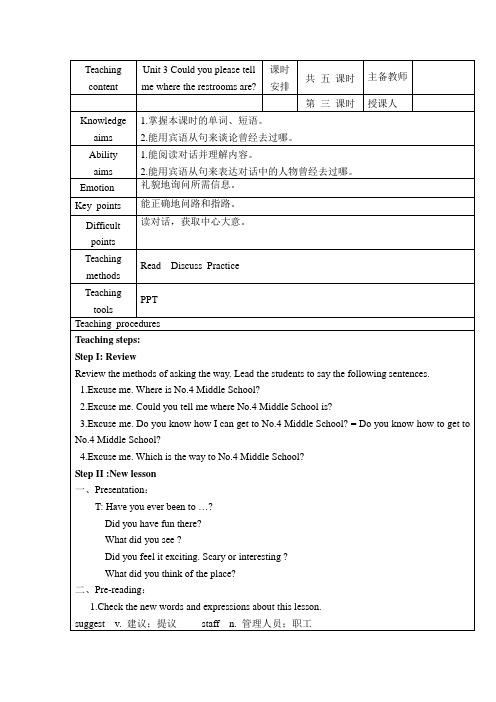
Teaching content Unit 3 Could you please tellme where the restrooms are?课时安排共五课时主备教师第三课时授课人Knowledgeaims 1.掌握本课时的单词、短语。
2.能用宾语从句来谈论曾经去过哪。
Ability aims 1.能阅读对话并理解内容。
2.能用宾语从句来表达对话中的人物曾经去过哪。
Emotion 礼貌地询问所需信息。
Key points 能正确地问路和指路。
Difficultpoints读对话,获取中心大意。
TeachingmethodsRead Discuss PracticeTeachingtoolsPPTTeaching proceduresTeaching steps:Step I: ReviewReview the methods of asking the way. Lead the students to say the following sentences.1.Excuse me. Where is No.4 Middle School?2.Excuse me. Could you tell me where No.4 Middle School is?3.Excuse me. Do you know how I can get to No.4 Middle School? = Do you know how to get to No.4 Middle School?4.Excuse me. Which is the way to No.4 Middle School?Step II :New lesson一、Presentation:T: Have you ever been to …?Did you have fun there?What did you see ?Did you feel it exciting. Scary or interesting ?What did you think of the place?二、Pre-reading:1.Check the new words and expressions about this lesson.suggest v. 建议;提议staff n. 管理人员;职工Scary adj. 可怕的Come on! 加油! promise v. & n. 承诺2.Have the student read the conversations and underline the words and expressions they don’t know.3.Correct the pronunciation.三、While-reading:1.Read the first scene, and determine the sentences are true or false.(1)Alice and He Wei are in Water World.(2)The new ride looks scary.2.Read the second scene, and determine the sentences are true or false.(1) Alice was scary at first.(2)Alice thinks the new ride is actually fun.(3)He Wei thinks Fun Times Park restaurant serves delicious food.3.Read the third and fourth scenes,and determine the sentences are true or false.(1)A rock band plays in Water City Restaurant every evening.(2) Alice and He Wei can go later to the restaurant.4.Read the conversation again and answer the questions below.(1)Why did Alice not want to go on the new ride? How did she feel after the ride?(2)What is special about Uncle Bob’s restaurant?(3)Should Alice and He Wei get there early for dinner? Why?5.Fill in the following blanks without reading the text.Where Fun Times ParkWho andTheme Here you can beSpace World Water WorldFun places Water CityRestaurantRestaurantService It serveslike andIt servesHow Scary butFeelings You neverknow whatwill happenuntilFor afternoon tea6.Underline the questions or statements in the conversation that ask for information. Rewritethem in a different way according to 3b.四、Explain the expressions.1.wonder作及物动词,意为“想知道;对……感到怀疑”;作不及物动词,意为“感到惊讶;感到疑惑”e on快点=be quick= hurry up3.serve sb. sth.promise意为“承诺,诺言”。
- 1、下载文档前请自行甄别文档内容的完整性,平台不提供额外的编辑、内容补充、找答案等附加服务。
- 2、"仅部分预览"的文档,不可在线预览部分如存在完整性等问题,可反馈申请退款(可完整预览的文档不适用该条件!)。
- 3、如文档侵犯您的权益,请联系客服反馈,我们会尽快为您处理(人工客服工作时间:9:00-18:30)。
人教版新目标九年级英语《Unit3 Could you please tell me where the restrooms are》教案Section A (1a-2d)1.重点单词:restroom,stamp,bookstore,beside,postcard,pardon,washroom,bathroom,normally,rush2.重点短语:take out the rubbish,fold your clothes,sweep the floor,make your bed,go out for dinner,get a ride3.重点句式:—Could you please tell me how to get to the bookstore.—Just go along Main Street until you pass Center Street.—Do you know when the bookstore closes today—It closes at 7:00 p.m. today.Do you know where I can get some postcardsI don't mean a room for resting.1.重点短语和句型2.疑问代词、疑问副词引导的宾语从句'疑问代词、疑问副词引导的宾语从句一、预习课本P17-18新单词并背诵,完成下面的汉译英。
1.洗手间________ 2.邮票________3.书店________ 4.在旁边________5.明信片________ 6.抱歉________7.洗手间________ 8.浴室________>9.通常________ 10.仓促________二、认真预习1a-2d找出下列短语和句型。
1.取一些钱________________________________________________________________________2.买一双鞋________________________________________________________________________3.—你能告诉我怎么到达商店吗—沿着Main大街走,直到你经过Center Street。
________________________________________________________________________________________________________________________________________________ `4.—你知道书店今天什么时候关门吗—它在晚上7:00关门。
________________________________________________________________________________________________________________________________________________5.你知道我能在哪儿买到明信片吗________________________________________________________________________6.我的意思不是休息的房间。
________________________________________________________________________;Step 1情景导入Teacher:Have you ever been to a strange place or a strange cityStudents:Yes,I have.Teacher:What would you do if you have any difficulties thereStudent1:I'd ask for help...Teacher:This class we'll learn how to ask the way or how to ask for help.环节说明:通过师生互动,引出本节课的语言学习目标——有礼貌地问路和求助。
、Step 2完成教材1a-1c的任务1.学生朗读1a中的短语,教师纠正错误读音,然后学生识记单词并且两人一组互相提问。
(3分钟)。
2.我们能在哪些地方做这些事情呢将地方和事情相匹配,完成后小组内互相核对答案。
(2分钟)3.阅读1a中的对话,为听力做好准备。
(2分钟)4.听录音,根据听力内容将1a中的对话补充完整,然后集体核对答案。
(3分钟)5.再听一遍录音,并跟读对话。
(2分钟)6.结对练习1c中的对话,并请一些学生表演出他们的对话。
(3分钟)7.模仿1c中的对话,用1a中的信息与同伴编练新对话来讨论你的城市,并邀请几组学生表演对话。
(5分钟)|参考案例A:Excuse me,could you please tell me how to get to the bookstoreB:Sure,just go along Main Street until you pass Center bookstore is on your right,beside the bank.A:you know when the bookstore closes todayB:It closes at 7:00 p.m. today.8.小结训练。
(3分钟)(A) you tell me ________A.where he is B.where is he\C.he is where(C) didn't know how ________ to LondonA.would they go B.are they goingC.they would go(A) you tell me ________ we get to the airportA.how B.whether C.where环节说明:听说结合,第一时间向学生传达语言目标,通过结对对话练习和小结训练,使语言目标得以强化。
Step 3完成教材2a-2c的任务】1.大声朗读2a中的短语和句子,然后听录音,将2a中的句子按听到的顺序排序,集体核对答案。
(3分钟)2.再听一遍录音,根据录音内容在2a图片上画出男孩到达超市的路线,完成后小组内核对答案。
(3分钟)3.听第三遍录音,学生跟读。
(3分钟)4.让学生利用2a中的信息仿照2c 的形式练习对话,并要求多组同学表演对话。
(5分钟)参考案例A:Excuse me,do you know where I can get some postcardsB:to the second is a bookstore between the bank and the supermarket.5.小结训练。
(3分钟):汉译英1.向左转turn_left2.向右转turn_right3.去二楼go_to_the_second_floor4.经过书店go_past_the_bookstore5.你知道我在哪里能买到明信片吗Do_you_know_where_I_can_get_some_postcards环节说明:通过听、说、读、写学习训练让学生掌握了问路指路的句型;并且使学生的口语表达能力在这一环节得到提升。
,Step 4完成教材2d的任务1.学生自读对话,理解对话内容,并且画出有疑问的句子。
(2分钟)2.小组内互相提问解决遇到的疑难问题,教师点拨重难点。
(3分钟)3.大声朗读2d中的对话,读熟后与同伴结对练习,分角色表演对话。
(3分钟)4.邀请三组学生来表演对话。
(5分钟)5.小结训练。
(3分钟)连词成句1.I,rides,am,the,excited,try,to~I_am_excited_to_try_the_rides!2.I,resting,don't for,mean,room,aI_don't_mean_a_room_for_resting.3.I,today,wonder,closes,when,park,theI_wonder_when_the_park_closes_today.环节说明:学生自学和小组合作学习相结合,有利于提高学生的自学能力和团队合作精神;小结训练又对对话中的重要句型进行了巩固加深。
Step 5问题探究宾语从句)1.你知道他刚才说什么了吗Did_you_know_what_he_said_just_now2.我想知道我们什么时候到达。
I_wonder_when_we_will_arrive.3.我问他我在哪里能挣到如此多的钱。
I_asked_him_where_I_could_earn_so_much_money.4.请告诉我我们必须要见谁。
Please_tell_me_who_we_will_have_to_meet.…5.你知道飞机什么时候起飞吗Do_you_know_when_the_plane_will_take_off当宾语从句是特殊疑问句时,由连接代词what、who、whom、whose、which或连接副词when、where、how、why引导,因为连接代词或连接副词在从句中担任一定的句子成分,具有一定的意义,所以不可以省略。
请学生们做前面课时训练部分。
Section A (3a-3b)~1.重点单词:suggest,staff2.重点短语:come on,pass by,on one's way to...3.重点句式:Let's ask what time the band starts.Alice and He Wei walk up to a staff person at the door.Come a little earlier to get a table.1.重点短语和句型(2.学会有礼貌的提出请求1.重点短语和句型2.学会有礼貌的提出请求一、预习课本P19新单词并背诵,完成下面的汉译英。
1.建议________ 2.职工________二、认真预习3a-3b找出下列短语和句型。
:1.加油________________________________________________________________________2.经过________________________________________________________________________3.在某人去……的路上________________________________________________________________________4.让我们去问一下乐队什么开始(表演)。
